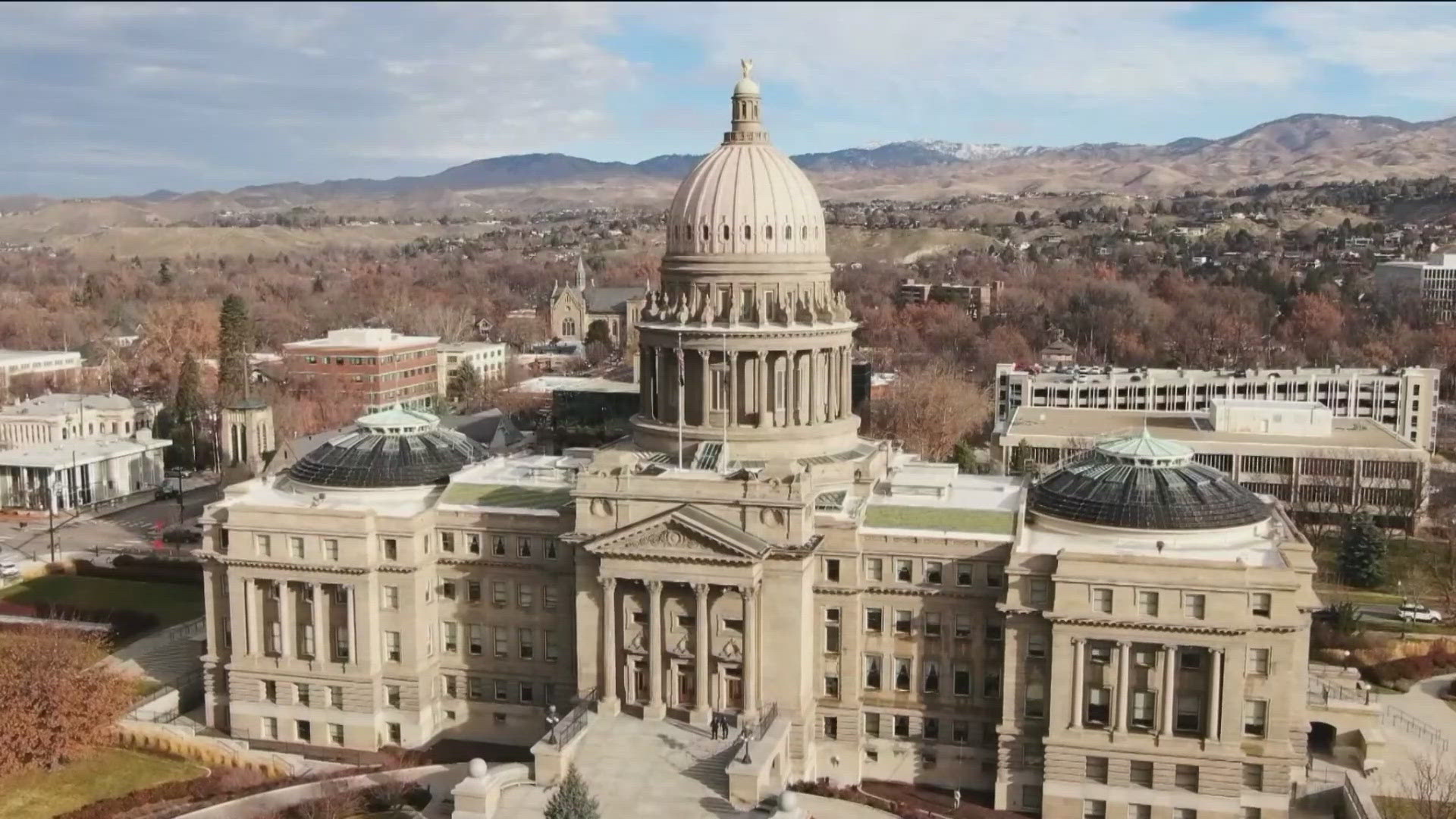BOISE, Idaho — This article originally appeared in the Idaho Press.
A myriad of far-reaching laws went into effect Monday. Much of the legislation passed included “emergency provisions,” making them effective July 1, rather than at the start of the new calendar year. Below are some of the notable laws addressing a wide range of issues including health care access, library materials, transgender rights, drug use and housing fee restrictions.
OBSCENE LIBRARY MATERIALS
Public and school libraries will now be required to allow anyone to submit a request that “obscene materials” be moved to an adults-only section of the library. According to the bill, “obscene materials” includes depictions of nudity, sexual conduct and excitement or “‘sado-masochistic abuse’ when it “appeals to the prurient interest of minors” and the descriptions are “patently offensive to prevailing standards in the community with respect to what is suitable material for minors.”
Once an individual submits a form to have certain material deemed obscene, a library will have 60 days after the receipt of the request to move the material to an adults-only section. A library’s failure to do so will result in $250 and other damages to be awarded to the individual who filed the complaint if they prevail in court.
ANTI-PORN LEGISLATION
Additional restrictions were passed aimed at limiting minors’ access to materials on the internet that are deemed harmful.
Minors as well as parents or guardians will now be able to “recover damages” against “commercial entities that publish or distribute” materials such as pornography that appeal to “the prurient interest.”
Action can be taken against a website or commercial entity if they knowingly publish materials harmful to minors and fail to perform age verification before providing access to the published materials.
EDUCATION INVESTMENT
New legislation will provide a total of $1.5 billion over the next 10 years as an investment into Idaho schools. The law looks to renovate Idaho’s aging education facilities and bring changes to the funding model of public schools.
According to prior reporting from the Idaho Press, the legislation would dedicate $125 million in ongoing sales tax revenue that the state would use to go out for a bond. Over 10 years, this would amount to more than $1 billion to be made available for schools for bonds and levies.
Districts can choose to receive a lump sum payment or an annual installment, and funding will distributed according to average daily attendance.
Notably, school districts that operated under a four-day week during fiscal year 2024 as well as districts that plan to operate on a four-day school week will have to provide proof that they are meeting the new minimum instructional hours that will be created by the State Board of Education starting July 1, 2025.
TRANSGENDER LEGISLATION
A number of laws passed during this year’s legislative session will target transgender people specifically.
Pronoun Bill — State of Idaho employees, including those employed by public schools and universities, cannot be compelled to refer to an individual by names or pronouns that “do not correspond with biological sex of the individual.”
Under the law, any public employee who refuses to address an individual by their preferred name or pronouns is protected from adverse action from an employer. Conversely, the law also bars any public employee from knowingly referring to a minor by their preferred name or pronouns without written consent from the minor’s parent.
The Legislature argued that the reasoning behind the legislation was to protect Idahoans’ “right to be free from coerced speech.”
Transgender Care Bill — Both minors and adults will now be barred from using public funding for gender-affirming care. This restriction means that Medicaid and other state insurances can no longer be used to fund procedures with the purpose of altering appearance to affirm an individual’s perception of their sex “in a way that is inconsistent with the individual’s biological sex.”
Physicians and other health care professionals employed by the state or local government are also barred from performing surgeries for the aforementioned purpose.
PARENTAL MEDICAL CONSENT
Additional health care changes are coming in the form of a parental medical consent law. Previously, Idaho minors were able to consent to some medical care, such as treatment for sexually transmitted infections. Children over 14 will also no longer have to provide consent to allow parents access to their medical records.
Parental consent will not be required if a minor needs medical care to prevent death or “imminent, irreparable physical injury” or if the parent could not be contacted and the minor’s life or health will be put at risk with further delay.
Emancipated minors will be exempt from the legislation.
CONTRACEPTIVE ACCESS
Legislative efforts to expand contraceptive access have been ongoing since 2018, when a bill requiring health plans to cover up to 12 months of prescription contraceptives was first introduced. Monday marked the end of an extended saga to expand contraceptive access in Idaho.
Health benefit plans will now be required to cover up to a six-month supply of prescription contraceptives to health plan enrollees. A smaller supply can only be given if prescribed by a provider, requested by the insurance enrollee or if the enrollee had not previously been prescribed contraceptives.
Excluded from the bill are any products designed to induce abortion or any emergency contraception approved by the Food and Drug Administration. Health plans that do not include coverage for prescription contraceptives will not be affected.
MATERNAL MORTALITY REVIEW
The Idaho Board of Medicine will now be able to collect information on the state’s maternal mortality rate. The bill comes after an Idaho Department of Health and Welfare committee on the matter was left to disband, making Idaho the only state to not review maternal mortality data. Moving forward, the Board of Medicine will publish an annual report on Jan. 31 of the maternal mortality rate along with any additional relevant information.


GADSDEN FLAG LICENSE PLATES
Idahoans will now be able to display the Gadsden Flag, colloquially known as the “Don’t tread on Me” flag, on their license plates. In addition to normal registration fees, the plate will cost $35 for its initial issuance and $25 for each subsequent annual registration.
The funds generated from purchases of the specialty plate will be used for the state’s firearm safety grant fund. The new plates will become available for purchase starting Jan. 1, 2025.
FENTANYL-FOCUSED LEGISLATION
To address the ongoing opioid epidemic in Idaho, a number of laws were put in place to both reduce harm for users and further penalize fentanyl traffickers.
Fentanyl test strips — Possession of fentanyl test strips will no longer be illegal. Under the new law, equipment intended to be used for “identifying whether a controlled substance contains fentanyl” will no longer be considered drug paraphernalia, a category that carries a misdemeanor for possession in Idaho.
Minimum sentences — The establishment of mandatory minimum sentences for trafficking fentanyl will go into effect alongside the test strips’ legalization. Possession of more than 4 grams will now result a minimum three-year imprisonment with a minimum fine of $10,000. Minimum sentences increase in tiers according to possession amount, with the maximum sentence of life in prison and a fine of $100,000.
REMOVED RENT RESTRICTIONS
Local governments will no longer be able to require landlords to participate in the Federal Housing Assistance Program, known as Section 8, to provide assistance for low-income households.
The bill will broadly prohibit any local governments from enacting an ordinance requiring landlords to participate in the aforementioned program, or any other program that regulates rent, fees or deposits.
This will have broader significance for the city of Boise, which has passed various ordinances pertaining to rental fees.
Previously reported on by the Idaho Press, the bill will make the city’s rental application fee cap of $30 go away this year, alongside another ordinance that “required security deposits to be returned when buildings are demolished.”
The bill is set to go into effect Jan. 1, 2025.
This article originally appeared in the Idaho Press, read more on IdahoPress.com.
Watch more Idaho politics:
See all of our latest political coverage in our YouTube playlist:
HERE ARE MORE WAYS TO GET NEWS FROM KTVB:
Download the KTVB News Mobile App
Apple iOS: Click here to download
Google Play: Click here to download
Watch news reports for FREE on YouTube: KTVB YouTube channel
Stream Live for FREE on ROKU: Add the channel from the ROKU store or by searching 'KTVB'.
Stream Live for FREE on FIRE TV: Search ‘KTVB’ and click ‘Get’ to download.


